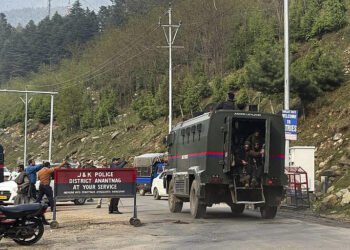Israel’s total blockade of Gaza has reached its 60th day.
No food, water or medical supplies have been allowed into the war-torn Gaza Strip since March 2, 2025, days before Israel broke the ceasefire on March 18, 2025, to restart the bombardments and ground assaults that have killed more than 52,000 Palestinians in the enclave since October 7, 2023.
The United Nations warned of “full-scale famine conditions” across the Strip and called for “concerted” action to stop the “humanitarian catastrophe” there.
The UN’s World Food Programme stated that all of its bakeries have shut down and all of its stocks inside Gaza have been fully depleted.
According to a report by the UN Office for the Coordination of Humanitarian Affairs (OCHA), widespread forced displacement has forced many people to abandon food supplies and emergency stocks secured during the ceasefire signed in January.

The report stated that most people cannot bake for themselves due to acute shortages of cooking fuel and the soaring cost of wheat flour.
It added that people are also forced to rely on aid supplies as farmers and breeders cannot access their land, as 70 percent of the enclave has been designated as a “no-go” area or is under displacement orders by the Israeli military.
The remaining soup kitchens in Gaza say they may have to shut down within days unless aid is allowed in.
As a result, some families are resorting to eating “whatever they can find”, even if it is not safe for consumption, according to the UN agency for Palestinians, UNRWA.
In addition, prices inside the enclave have skyrocketed by more than 500 percent, NGO Mercy Corps disclosed, which warn that Gaza’s food systems could collapse entirely unless borders open immediately.
Meanwhile, the world’s hunger watchdog, known as the Integrated Food Security Phase Classification (IPC) system, began an analysis of the lack of food and malnutrition in the Gaza Strip.
According to OCHA, the assessment began on April 28, 2025, and will last one week.
It said that more than 50 trained analysts from UN agencies and aid groups, from the Gaza Strip and abroad, are taking part in the exercise.
For the IPC to declare a famine, it says, three conditions backed by evidence must be met: at least 20 percent of the population in that particular area is facing an extreme lack of food, at least 30 percent of the children are too thin for their height and at least two people out of every 10,000 are dying each day due to outright starvation or to the interaction of malnutrition and disease.
The IPC had issued at least four warnings since Israel’s genocidal actions on Gaza began, saying the territory could be teetering on the precipice of famine.
Deliberate Policy Of Starvation of Gaza

Gaza-based human rights group, Al Mezan asserted that Israel, through its 60-day total blockade on Gaza, is pursuing “a deliberate policy of starvation, enforced with full knowledge of its consequences on two million people.”
In a series of social media posts, the organisation disclosed that the Israeli military has bombed at least 28 kitchens and 37 aid centres since its war on Gaza began in October 2023.
Al Mezan stated that in Nuseirat refugee camp in central Gaza, a kitchen that feeds more than 2,000 Palestinian families per day is running out of supplies.
Staff have reported they may be forced to close within days as a result of a lack of supplies.
“Statements of condemnation without action are meaningless. Blocking life-saving aid to 2 million civilians is not just unacceptable – it is criminal and genocidal. The blockade must end. Accountability must be ensured.”
Al Mezan
READ ALSO: ICJ Commences Day 2 Hearings On Israel’s Humanitarian Obligations To Palestinians




















